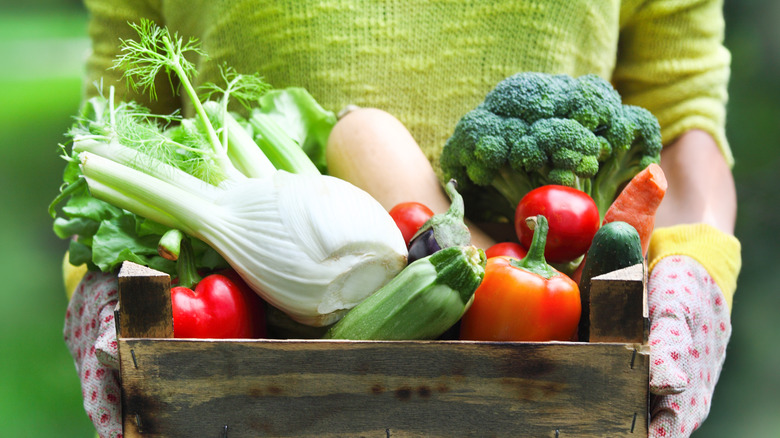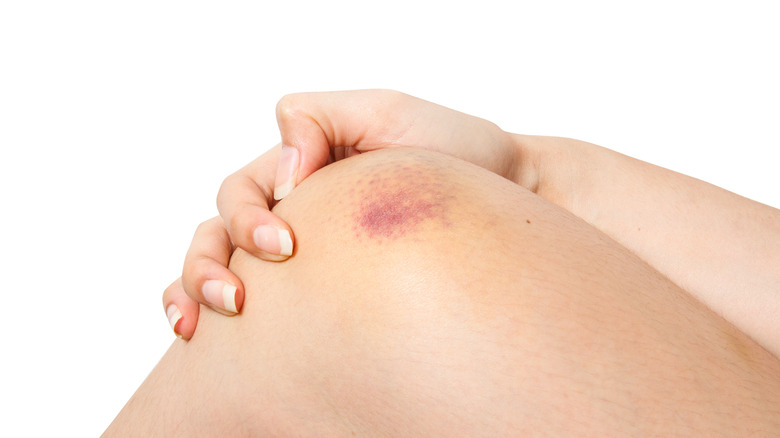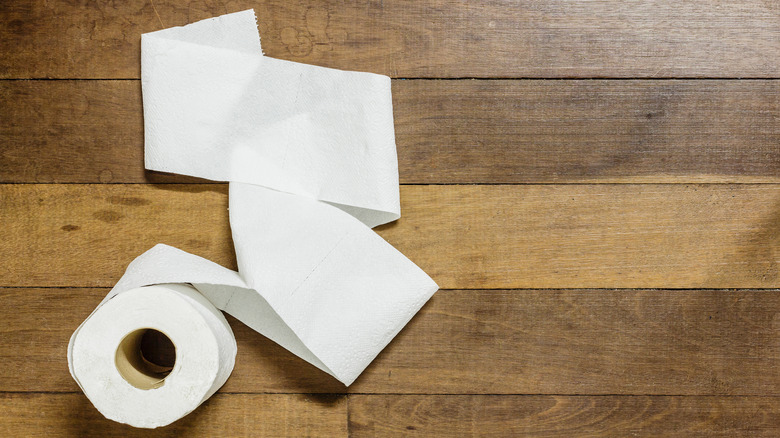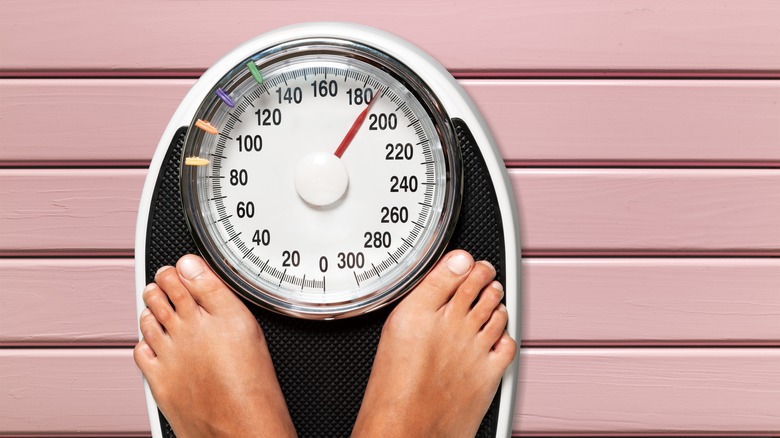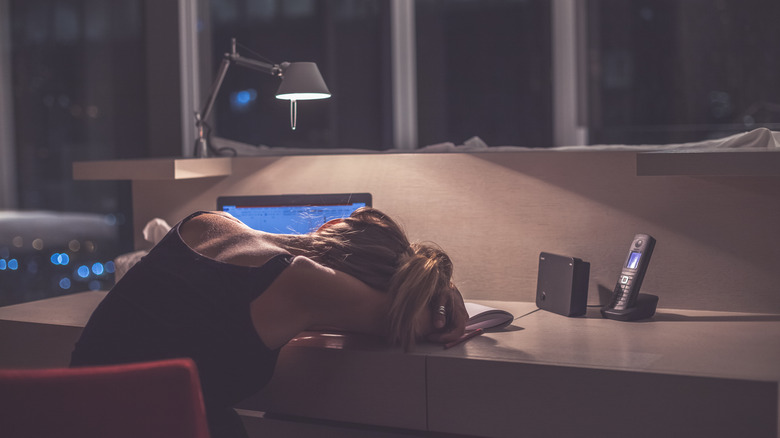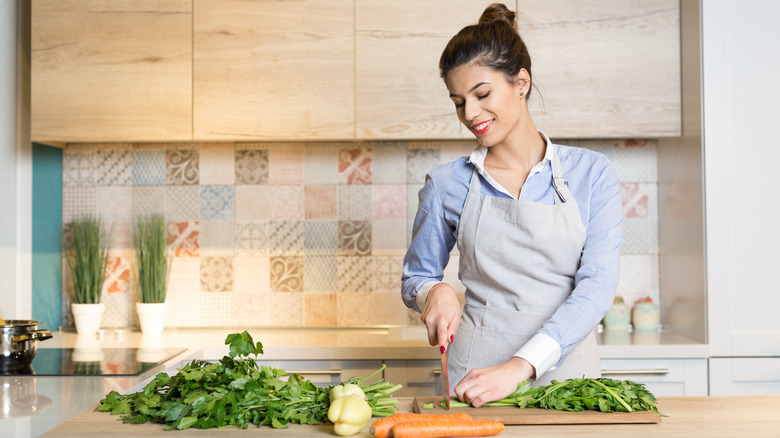Signs You're Not Eating Enough Veggies
Growing up, you likely were told repeatedly to take just a few more bites of whatever vegetable was on your dinner plate. Now that you're older and in charge of your own eating habits, you may have noticed that you eat differently than you did with your family. When I moved away for graduate school and lived by myself, it was really the first time that I cooked only for one and could make whatever my little heart desired. My standbys and fall backs were different than my family's had been while I was growing up. I didn't eat a side salad every night, but filled my main course with more vegetables than I'd previously been used to. Still, I probably wasn't eating as many vegetables each day as I should have been.
As it turns out, the vast majority of Americans aren't. The USDA recommends that most Americans eat between two and three cups of vegetables each day, depending on your specific needs and calorie intake. According to a study conducted by the Centers for Disease Control and Prevention (CDC), from 2007 to 2010, 87 percent of Americans fell short of USDA vegetable intake recommendations. Think you might fall into that 87 percent? Here are some signs for which to watch out.
You bruise like a peach
If every little bump, stumble, or scrape results in a nasty, painful bruise, your low veggie intake may be to blame. In an interview with Prevention, Dr. Gary Goldenberg, assistant professor of dermatology at the Mount Sinai Hospital, said that vitamin C deficiencies (serious nutritional deficiencies, it should be noted, aren't common in the United States) can cause more bruising than normal because vitamin C helps with healing and collagen production. Without it, blood vessels are more vulnerable, making bruising your daily reality.
Load up on citrus fruits, kale, bell peppers, broccoli, and cauliflower, which, according to Health, are all good sources of vitamin C.
You're a little bit constipated
Constipation is no joke. It's uncomfortable — you likely feel gassy and bloated and just generally icky. Not eating enough vegetables can cause constipation because most veggies are good sources of fiber, which helps keep you regular. According to nutritional facts compiled by Greatist, artichokes, avocados, broccoli, and brussels sprouts are all considered high-fiber vegetables. Incorporating more of those into your diet and fewer highly-processed and low-fiber foods can help alleviate your constipation and get things running smoothly once again.
You only shop the interior aisles of the grocery store
Grocery store design often follows a particular pattern: more processed packaged foods, like cookies, crackers, chips, cereals, canned goods, and the like are shelved towards the center of the store. Fresh fruits and vegetables, proteins, dairy, and ready-made foods, on the contrary, often make up the perimeter of the store. Because of this setup, if you're only shopping the interior aisles every time you run into the grocery store for quick dinner ingredients after work, chances are you're missing the fresh vegetables entirely. According to WebMD, focusing your shopping on the perimeter aisles, where the majority of the fresh food is typically housed, before venturing into the middle aisles for anything specific that you need, will help you eat healthier.
You're always hungry
Fiber, that same culprit that keeps you from getting constipated, also helps fill your belly. In an interview with Prevention, registered dietitian Frances Largeman-Roth said that if you notice that you're feeling hungry an hour or two after eating, it might be because you didn't get enough fiber in your last meal. Adding high-fiber veggies or legumes can help keep you fuller longer.
You're gaining weight
If you're not eating enough veggies, you're likely eating a lot of less healthy, more highly processed foods. According to SF Gate, veggies fill you up (fiber!) without adding a ton of calories to your diet, making them a good choice if you're trying to watch your weight. Opting for other choices like meats, carbs, or fats, doesn't keep you full as long. Adding insult to injury, they are higher in calories. If you see the number on your bathroom scale gradually creeping upwards, insufficient vegetable intake just might be the reason.
You're exhausted
If you're tired all the time and just can't figure out why, you might need to take a look at your diet. According to an article from Psych Central, vegetables (and fruits) provide all kinds of nutrients that people need to boost their energy.
Add more dark, leafy greens to your diet to make sure you get more magnesium, which helps with energy production.
You're breaking out
You've likely heard about acne and dairy or sugar, but what about breakouts and veggies? In an interview with Forbes, celebrity esthetician Joanna Vargas recommended lots of veggies of a variety of colors, plus avocados, to help get beautiful skin. Additionally, in the same piece, dermatologist Dr. Jessica Wu recommended red, yellow, and green vegetables for their antioxidant content. Wu said that antioxidants help fight against collagen breakdown over time, which is essential for healthy skin.
You keep getting sick
In an interview with Reader's Digest, registered dietitian Abby Sauer said that if you don't eat enough veggies, your immune system may not have the capabilities to fight off illnesses as effectively. In order to get well and stay well, you might need to eat more vegetables. Sauer recommended dark, leafy greens for boosting your immune system and making sure you're on the mend. Kale, chard, and collard greens are all good choices.
You get forgetful
Keep forgetting the simplest of things? Eat more veggies. According to a 2015 press release from Tufts University, lutein can help improve your memory as well as other cognitive skills. Dark, leafy greens are good sources of lutein, as are squash, corn, pumpkin, broccoli, lettuce, asparagus, and carrots, according to SF Gate. Load up on summer and fall veggies to get more lutein into your diet.
You're probably not eating enough vegetables
Chances are, you don't eat your daily recommended allotment of veggies. There are a number of reasons why you should try to up your intake, from the prevention of serious diseases and conditions to how you look and feel to making sure you're able to get all of the nutrients you need. If you notice any of these signs start to appear in your own life, make a more conscious effort to eat more vegetables. Your body, health, and well-being will likely thank you.
